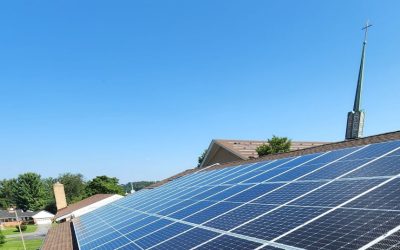If you’re looking to invest in the future of alternative energy, clean energy ETFs may be the way to go. With the increasing demand for alternative energy sources, these ETFs are becoming popular investment options. Factors such as the rising price of oil and geopolitical unrest have contributed to the favorable economics of alternative energy. In this article, we’ll be discussing seven clean energy ETFs that are recommended for investors interested in the sector. Each ETF has its own focus and holdings, ranging from a broad clean energy approach to specific sectors like solar energy or clean infrastructure. By investing in these ETFs, not only can you support a greener economy, but you can also benefit from the future growth of clean energy technologies.
Clean Energy ETFs
Introduction to Clean Energy ETFs
Clean energy ETFs have gained popularity among investors as the demand for alternative energy sources continues to rise. With concerns over climate change and the need for sustainable energy solutions, clean energy ETFs offer an excellent opportunity to invest in companies focused on providing cleaner and more efficient energy options.
Increasing demand for alternative energy sources
The increasing demand for alternative energy sources is one of the key factors driving the popularity of clean energy ETFs. As the price of oil continues to rise and geopolitical unrest creates uncertainties in the traditional energy markets, there is a growing interest in renewable energy solutions. Clean energy ETFs allow investors to capitalize on this demand and support companies that are working towards a greener future.
Favorable economics of alternative energy
The favorable economics of alternative energy have also contributed to the growth of clean energy ETFs. With the price of oil reaching $90 a barrel, renewable energy sources such as wind, solar, and hydroelectric power have become more competitive. As these technologies become more efficient and cost-effective, the profitability of clean energy companies is expected to increase, making them attractive investment options.
Recommended Clean Energy ETFs
Here are seven clean energy ETFs that are recommended for investors interested in the sector:
iShares Global Clean Energy ETF (ICLN)
The iShares Global Clean Energy ETF (ICLN) is one of the largest and most popular clean energy ETFs. It provides investors with exposure to a global portfolio of clean energy companies involved in renewable energy generation and conservation. With a diversified portfolio and a focus on clean energy companies worldwide, ICLN offers investors a broad exposure to the clean energy sector.
First Trust Nasdaq Clean Edge Green Energy Index Fund (QCLN)
The First Trust Nasdaq Clean Edge Green Energy Index Fund (QCLN) focuses on companies involved in the clean energy sector, including renewable energy, energy efficiency, and advanced transportation. QCLN tracks the performance of the Nasdaq Clean Edge Green Energy Index, which selects companies based on factors such as market capitalization, liquidity, and industry classification.
Invesco Solar ETF (TAN)
The Invesco Solar ETF (TAN) is dedicated to companies involved in the solar energy industry. TAN seeks to track the performance of the MAC Global Solar Energy Index, which includes companies engaged in various aspects of the solar energy supply chain, from solar module production to installation and distribution.
First Trust Nasdaq Clean Edge Smart Grid Infrastructure Index (GRID)
The First Trust Nasdaq Clean Edge Smart Grid Infrastructure Index (GRID) focuses on companies involved in the smart grid infrastructure sector. GRID tracks the performance of the Nasdaq Clean Edge Smart Grid Infrastructure Index, which selects companies that develop, produce, and distribute technologies related to the smart grid infrastructure.
Invesco WilderHill Clean Energy ETF (PBW)
The Invesco WilderHill Clean Energy ETF (PBW) invests in companies involved in the clean energy sector, including renewable energy, energy efficiency, and conservation. PBW tracks the performance of the WilderHill Clean Energy Index, which selects companies based on factors such as market capitalization, liquidity, and industry classification.
BlackRock World ex U.S. Carbon Transition Readiness ETF (LCTD)
The BlackRock World ex U.S. Carbon Transition Readiness ETF (LCTD) focuses on companies outside the United States that are ready to transition to a low-carbon economy. LCTD seeks to track the performance of the BlackRock Carbon Transition Readiness Index, which selects companies based on their carbon-related risks and opportunities.
ALPS Clean Energy ETF (ACES)
The ALPS Clean Energy ETF (ACES) invests in companies involved in the clean energy sector, including renewable energy, energy efficiency, and clean transportation. ACES tracks the performance of the CIBC Atlas Clean Energy Index, which selects companies based on factors such as market capitalization, liquidity, and industry classification.
Focus and Holdings of Clean Energy ETFs
Clean energy ETFs have different focuses and holdings, allowing investors to choose ETFs that align with their investment goals and preferences. Some clean energy ETFs take a broad approach and invest in companies involved in various clean energy sectors, while others may focus on specific sectors such as solar energy or clean infrastructure.
Broad clean energy approach
Clean energy ETFs with a broad approach invest in companies involved in various clean energy sectors, including renewable energy sources like wind, solar, hydroelectric power, and geothermal energy. These ETFs provide investors with exposure to a diversified portfolio of clean energy companies, allowing them to benefit from the overall growth of the clean energy sector.
Specific sectors like solar energy
Some clean energy ETFs have a specific focus on sectors like solar energy. These ETFs invest in companies involved in the production, installation, and distribution of solar energy solutions. By focusing on a specific sector, these ETFs allow investors to capitalize on the growth and advancements in the solar industry.
Clean infrastructure
Clean infrastructure ETFs concentrate on companies involved in the development and maintenance of clean and sustainable infrastructure. These companies may be engaged in projects related to energy storage, electric vehicle charging stations, smart grid technologies, and other clean infrastructure initiatives. Investing in clean infrastructure ETFs provides exposure to companies that are critical in building a greener and more sustainable future.
Supporting a Greener Economy
Investing in clean energy ETFs not only provides financial returns but also supports the transition to a greener economy. By allocating capital to companies focused on clean energy solutions, investors can contribute to reducing carbon emissions, promoting sustainability, and mitigating the impacts of climate change. Clean energy ETFs offer a way for individuals to align their investment strategies with their values and actively participate in creating a more sustainable future.
Benefiting from future growth
In addition to supporting a greener economy, investing in clean energy ETFs offers the potential for future growth. As the demand for clean energy continues to rise, companies in the sector are expected to experience significant growth. By investing in clean energy ETFs, investors can position themselves to benefit from the expansion of the clean energy market and the advancements in clean energy technologies.
In conclusion, clean energy ETFs are a compelling investment option for individuals looking to support a greener economy while potentially earning financial returns. With increasing demand for alternative energy sources, favorable economics, and a wide range of ETF options available, investors have the opportunity to align their investments with their values and contribute to a more sustainable future.









